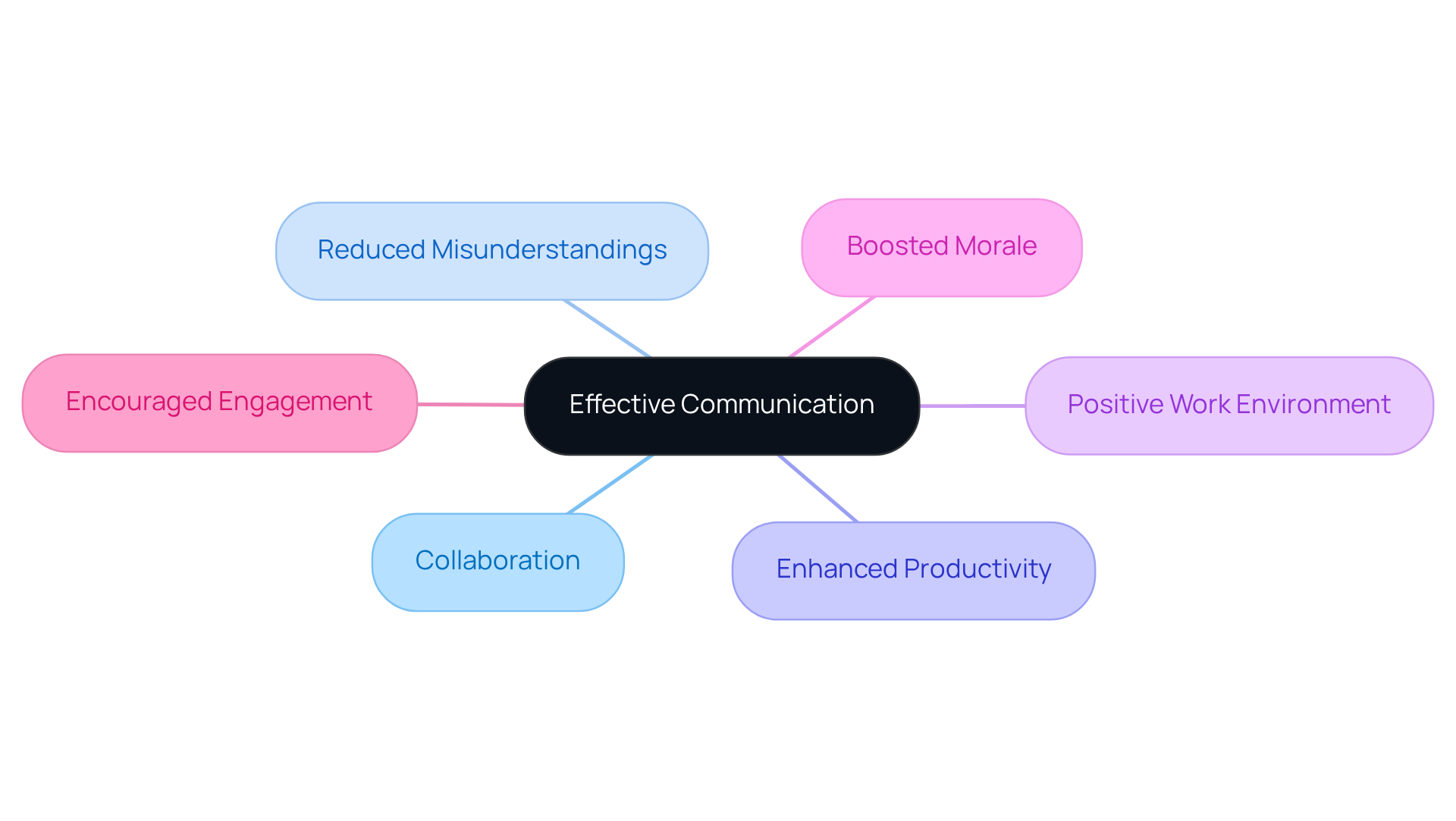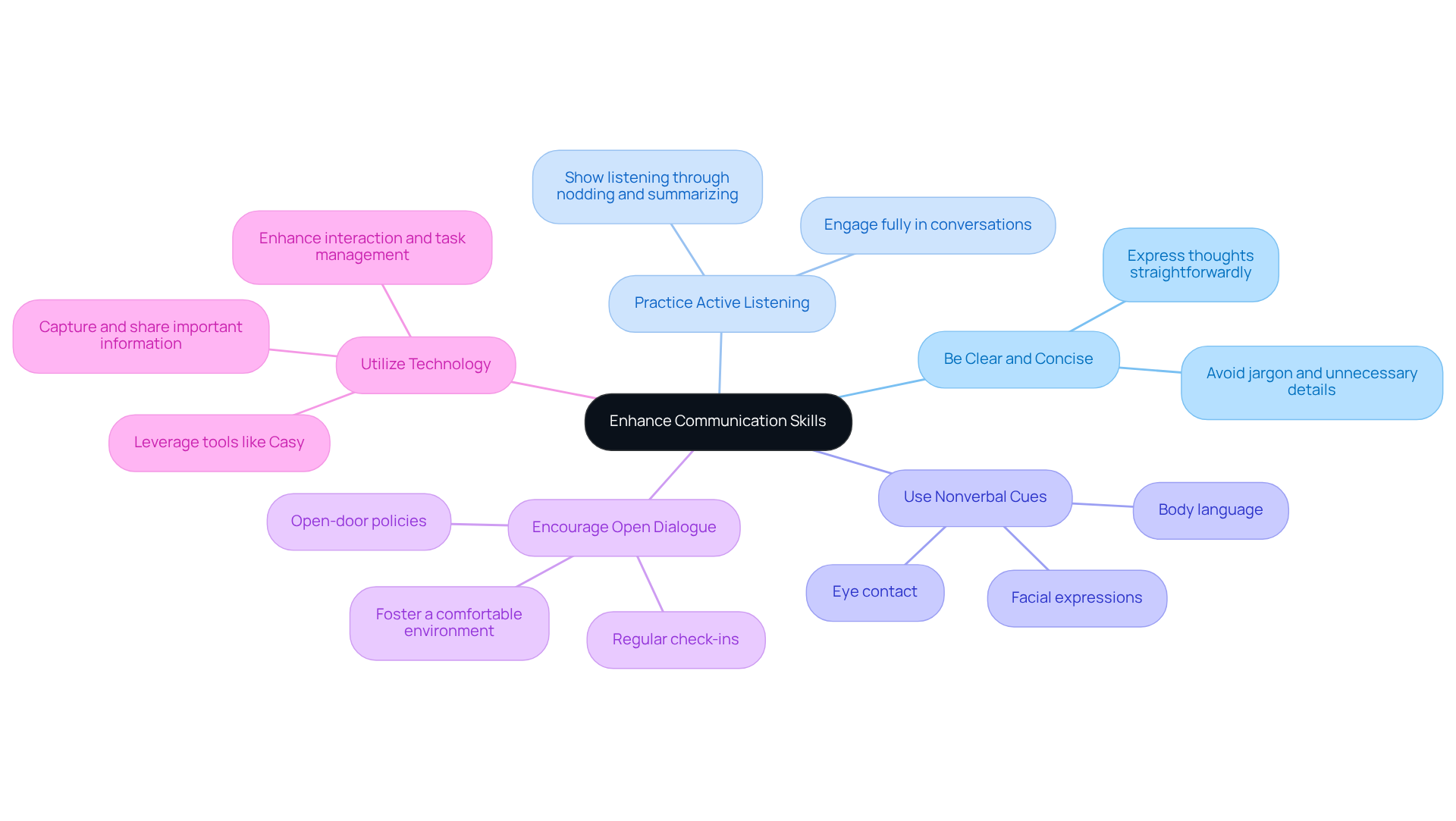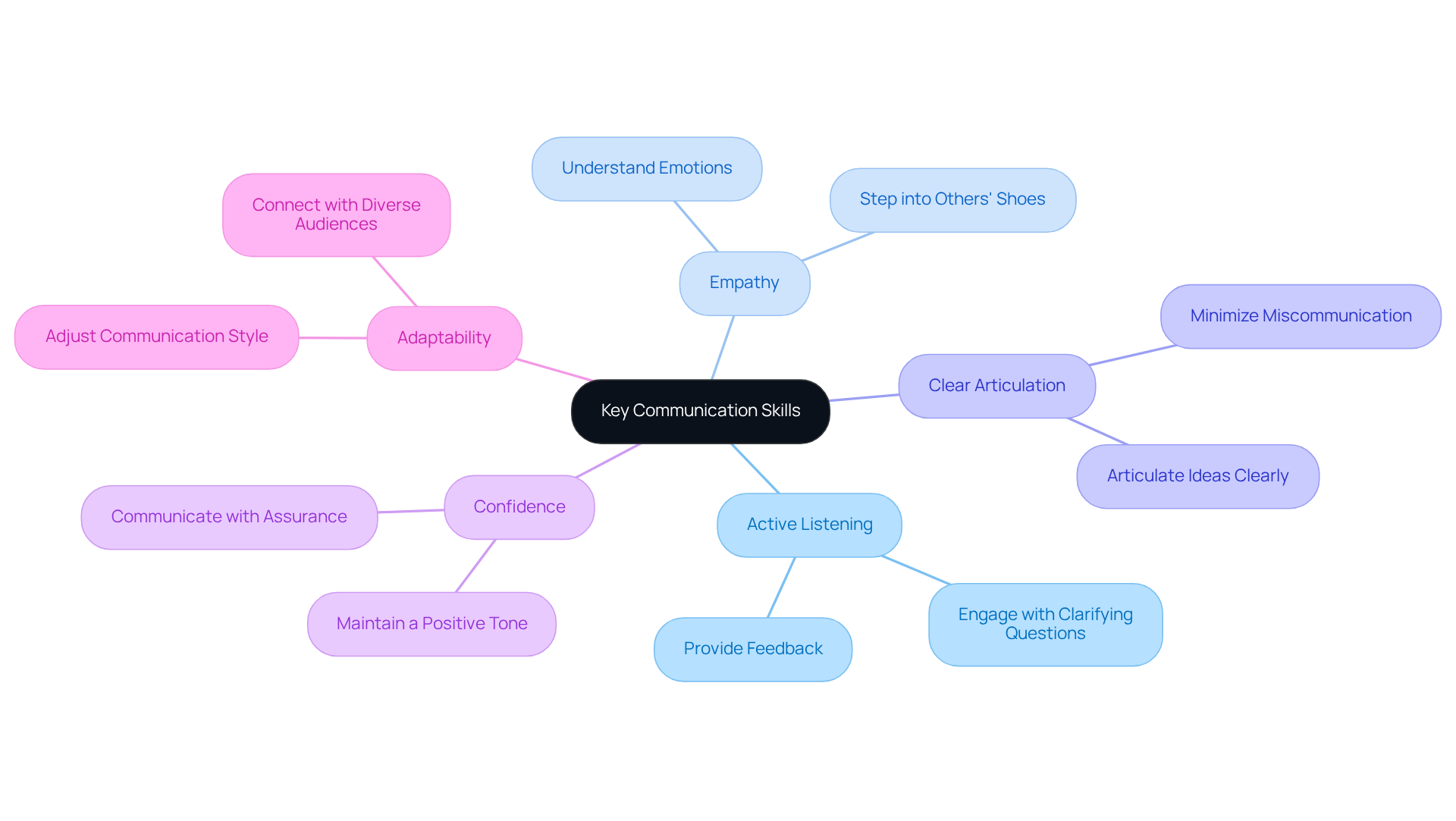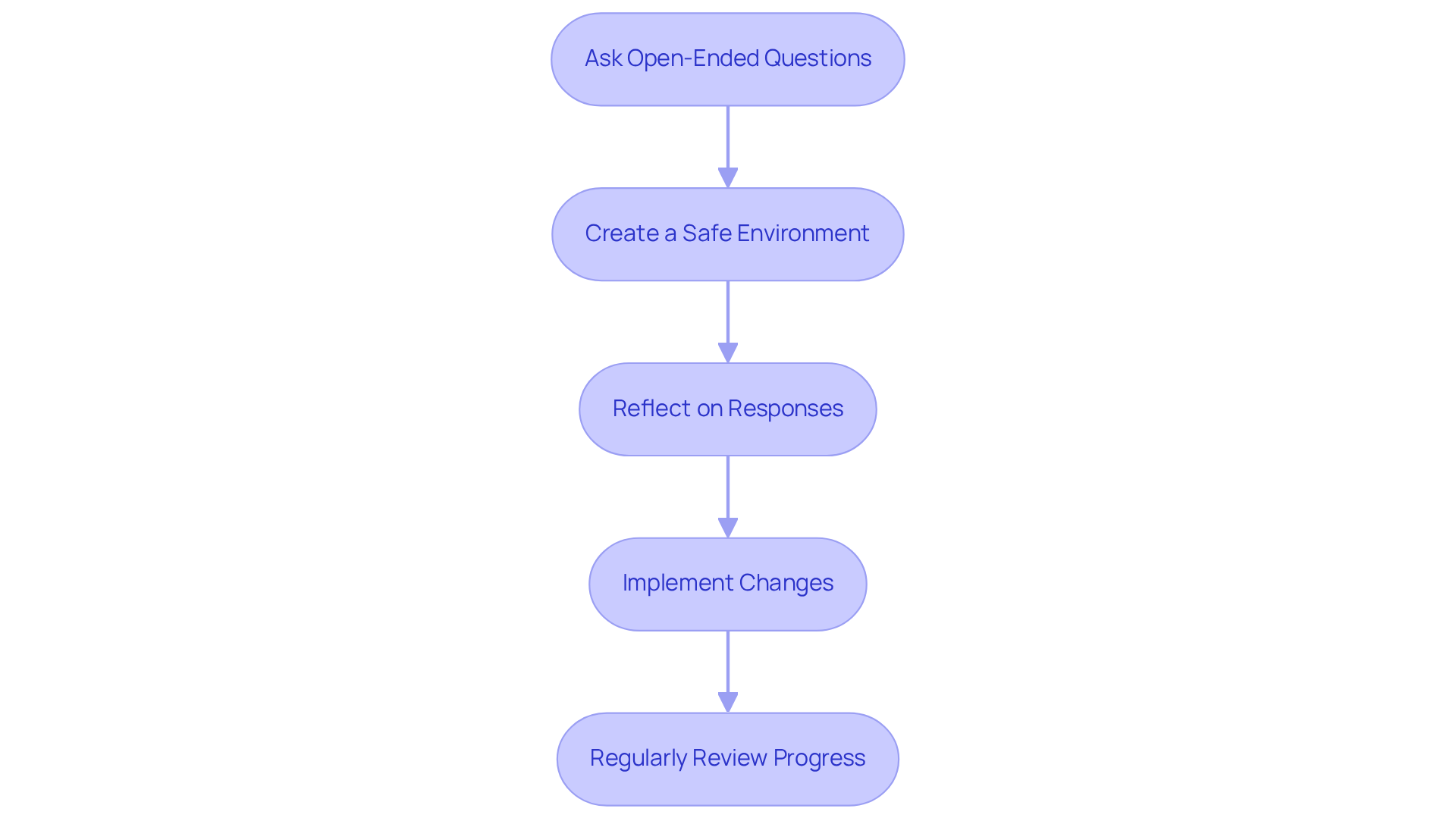Overview
The article delineates four pivotal steps to enhance communication skills in the workplace.
- It underscores the significance of effective communication, establishing a foundation for the subsequent strategies.
- Practical techniques are introduced, aimed at fostering collaboration and minimizing misunderstandings.
- The third step focuses on developing essential communication skills, which are crucial for enhancing overall workplace productivity.
- Finally, the article emphasizes the importance of soliciting feedback for continuous improvement.
Each step is bolstered by specific insights that illustrate how clear communication can transform workplace dynamics, ultimately prompting readers to take action and refine their communication practices.
Introduction
Effective communication stands as the backbone of any successful workplace, influencing everything from team dynamics to overall productivity. Mastering this essential skill not only fosters collaboration and minimizes misunderstandings but also cultivates a positive environment where employees feel valued and engaged. Yet, many professionals grapple with communication challenges, often left to ponder: what are the most effective strategies to enhance these vital skills? This guide explores practical steps to improve communication in the workplace, unlocking the potential for greater collaboration and success.
Understand the Importance of Effective Communication
Effective interaction is essential in the workplace and is a crucial part of how to improve communication skills in the workplace, as it fosters collaboration, reduces misunderstandings, and enhances overall productivity. When team members communicate clearly, they can share ideas, provide feedback, and resolve conflicts more efficiently. Furthermore, effective interaction contributes to a positive work environment, where employees feel valued and understood. This not only boosts morale but also encourages engagement and innovation. Understanding these advantages is the first step toward learning how to improve communication skills in the workplace, providing the motivation needed to enhance your everyday exchanges.

Implement Practical Strategies to Enhance Communication
To enhance your communication skills, consider implementing the following practical strategies:
- Be Clear and Concise: Express your thoughts straightforwardly. Avoid jargon and unnecessary details that may confuse your audience.
- Practice Active Listening: Engage fully in conversations by listening attentively. Show that you are listening through nodding and summarizing what the speaker has said.
- Use Nonverbal Cues: Pay attention to your body language, eye contact, and facial expressions. These nonverbal signals can significantly impact how your message is received.
- To learn how to improve communication skills in the workplace, encourage open dialogue and foster an environment where team members feel comfortable sharing their thoughts and feedback. This can be achieved through regular check-ins and open-door policies.
- Utilize Technology: Leverage tools like Casy to enhance interaction and task management, ensuring that important information is captured and shared effectively.

Develop Key Communication Skills for Success
To enhance your communication skills, concentrate on developing these essential areas:
- Active Listening: This involves not just hearing but truly understanding the speaker's message. Engage by asking clarifying questions and providing feedback as part of learning how to improve communication skills in the workplace to demonstrate your involvement.
- Empathy: Grasping the emotions and viewpoints of others is essential when learning how to improve communication skills in the workplace, as it can significantly enhance your interactions. Practice stepping into others' shoes to cultivate stronger relationships.
- Aim to articulate your ideas clearly and concisely as a fundamental way of how to improve communication skills in the workplace. This minimizes the chances of miscommunication and ensures your audience comprehends your points.
- Confidence: Communicate with assurance and maintain a positive tone. Your confidence is crucial in understanding how to improve communication skills in the workplace, as it shapes how your message is received and encourages others to engage with you.
- Adaptability: Adjust your communication style to fit various audiences and contexts. Flexibility in your approach is a key aspect of how to improve communication skills in the workplace, enabling you to connect with a wide array of individuals.

Solicit Feedback and Continuously Improve Communication
To ensure continuous improvement in your interaction abilities, it is essential to actively seek feedback on how to improve communication skills in the workplace from your peers and superiors. Consider these effective strategies:
- Ask Open-Ended Questions: When soliciting feedback, frame your inquiries to elicit detailed responses. For instance, ask, 'What aspects of my communication could I enhance?'
- Create a Safe Environment: Cultivate a culture where team members feel at ease sharing honest opinions without the fear of negative consequences.
- Reflect on Responses: Dedicate time to thoughtfully consider the feedback you receive, identifying actionable steps for growth. This reflection is crucial for learning how to improve communication skills in the workplace.
- Implement Changes: Take decisive action based on the insights gained by adjusting your communication style or methods. This not only showcases your commitment to how to improve communication skills in the workplace but also inspires others to follow suit.
- Regularly Review Progress: Allocate time for periodic evaluations of your communication skills. This may involve self-assessment or seeking additional feedback to measure your growth over time.

Conclusion
Effective communication stands as a cornerstone of a thriving workplace, significantly influencing collaboration, productivity, and employee morale. Recognizing its importance and applying practical strategies empowers individuals to enhance their communication skills, ultimately leading to a more harmonious and efficient work environment. This journey toward improved communication not only benefits personal interactions but also fosters a culture of openness and engagement within teams.
To achieve better communication, consider essential steps such as:
- Being clear and concise
- Practicing active listening
- Adapting communication styles to suit different audiences
Developing key skills like empathy and confidence, alongside soliciting feedback, facilitates continuous improvement in communication practices. By embracing these strategies, misunderstandings can be significantly reduced, creating a more positive workplace atmosphere.
Ultimately, prioritizing effective communication transcends personal growth; it contributes to collective success that enhances overall business performance. As organizations strive for excellence, investing in communication skills becomes imperative. What actionable steps can you take today to pave the way for a more collaborative and innovative future in your workplace?
Frequently Asked Questions
Why is effective communication important in the workplace?
Effective communication is crucial in the workplace as it fosters collaboration, reduces misunderstandings, and enhances overall productivity.
How does clear communication benefit team members?
Clear communication allows team members to share ideas, provide feedback, and resolve conflicts more efficiently.
What impact does effective communication have on the work environment?
Effective communication contributes to a positive work environment where employees feel valued and understood, which boosts morale and encourages engagement and innovation.
What is the first step toward improving communication skills in the workplace?
Understanding the advantages of effective communication is the first step toward learning how to improve communication skills in the workplace.




